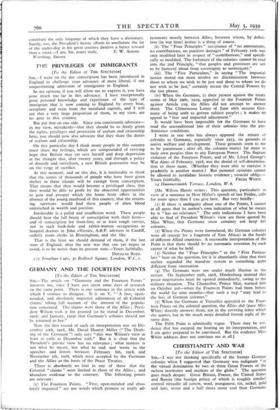GERMANY AND THE FOURTEEN POINTS
[To the Editor of THE SPECTATOR] SIR,—The article on " Germany and the Fourteen Points " interests me, since I have just spent some days of research on the same point. There is one sentence in the article with which I venture to disagree. It is on V, " ' A free, open- minded, and absolutely impartial adjustment of all Colonial claims,' taking full account of the interest of the popula- tion concerned. The claims were those of the Allies ; Presi- dent Wilson took it for granted (as he stated in December, 1918, and January, 1919) that Germany's colonies should not be returned to her."
Now the first record of such an interpretation was on De- cember loth, 1918, Mr. David Hunter Miller (" The Draft- ing of the Covenant ") only says " this was Wilson's view at least as early as December loth." But it is clear that the President's private view has no relevance ; what matters is not what he meant, but what he said and wrote in the speeches and letters between February 8th, 1918, and November 5th, 1918, which were accepted by the Germans and the Allies as the bases of the Peace Treaties.
There is absolutely no hint in any of these that the Colonial " claims-" were limited to those of the Allies ; and abundant evidence to the contrary. The following points are relevant :
(i) The Fourteen Points. " Free, open-minded and abso- lutely impartial " are not words which promise or imply ad-
justments merely between Allies, between whom, by defini- tion (in war time) justice is a thing of course.
(ii) The " Four Principles " acceptance of " no annexations, no contributions, no punitive damages " of February nth was only modified later in respect of " contributions," and specifi- cally so modified. The forfeiture of the colonies cannot be read into the 2nd Principle, " that peoples and provinces are not to be bartered about from sovereignty to sovereignty."
(iii) The " Five Particulars," in saying " The impartial justice meted out must involve no discrimination between those to whom we wish to be just and those to whom we do not wish to be just," certainly meant the Central Powers by the last phrase.
(iv) When the Germans, In their protest against the treaty terms of May 29th, 1919, appealed to the Fourteen Points against Article 119, the Allies did not attempt to answer them. The Clemenceau Letter of June 16th accuses Ger- many of being unfit to govern subject peoples ; it makes no appeal to " free and impartial adjustment."
It would have been impossible for the Germans to have read the unconditional loss of their colonies into the pre- Armistice conditions.
I write as one who has always opposed the return of colonies to Germany, especially since 1933, on grounds of native welfare and development. These grounds seem to me to be paramount ; after all, the colonies matter far more to tneir own peoples than to any European Power. The flagrant violation of the Fourteen Points, and of Mr. Lloyd George's War Aims of February, 1918, was the denial of self-determina- tion to these races. (Whether they were able to exercise it prudently is another matter.) But personal opinions cannot be allowed to invalidate historic evidence ; veracite oblige.— Yours faithfully, FREDA WHITE. t4 Hammersmith Terrace, London, W.6.
[Mr. Wilson Harris writes : This question, particularly in view of a sentence in Herr Hitler's speech of last Friday, calls for more space than I can give here. But very briefly: (i) If there is ambiguity about one of the Points, I cannot at all agree that its author's own indication of what he meant by it " has no relevance." The only indications I have been able to find of President Wilson's view are those quoted by Miss White, that Germany must certainly not keep her colonies.
(2) When the Points were formulated, the German colonies were all (except for a fragment of East Africa) in the hands of different Allied countries. A reasonable interpretation of the Point is that there should be no automatic retention by each captor of what he held.
(3) Neither the " Four Principles " or the " Five Particu- lars " bear on the question, for it is abundantly clear that their author regarded the mandate system as something quite different from annexation.
(4) The Germans were not under much illusion in the matter. On September 29th, 1918, Hindenburg insisted that peace negotiations must be opened immediately, owing to the military situation. The Chancellor, Prince Max, warned him on October 3rd—when the Fourteen Points had been before the world for nine months—that such a step " may lead to the loss of German colonies."
(5) When the Germans at Versailles appealed to the Four- teen Points on the colonial question, the Allies did (pace Miss White) directly answers them, not in the covering letter which she quotes, but in the much more detailed formal reply of the same date.
The Fifth Point is admittedly vague. There may be evi- dence that has escaped me bearing on its interpretation, and I am quite prepared to be convinced. But the evidence Miss White adduces does not convince me at all.]














































 Previous page
Previous page